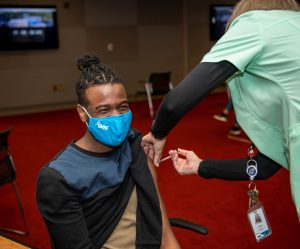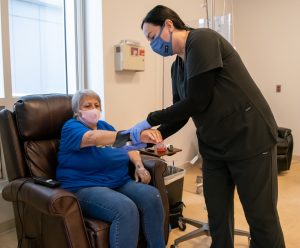
This past Monday morning, I found myself drooling. It was sort of Pavlovian, sort of not.
You see, since the fall, the Oklahoma Medical Research Foundation has been conducting weekly PCR (polymerase chain reaction) Covid-19 testing of all onsite employees. Each Monday morning, boxes packed with saliva-gathering kits greeted us at building entrances. In case you forgot, OMRF Vice President of Human Resources Courtney Greenwood sent out cheerily pesky emails reminding you to “submit your spit.”
And submit I did.
Thanks to innovative repurposing of equipment that he’d been using to study lupus and autoimmune disease, OMRF’s Dr. Joel Guthridge was able to create a highly accurate testing system that did away with the much-maligned nasal swab. All we had to do was go puh-tooey in a cup. If we hadn’t heard from HR by late in the week, we knew we were okay.
Especially at times when cases surged and vaccines weren’t yet available, we didn’t have to choose between our jobs and our safety. “I felt really good coming into work, even during the worst stretches of the pandemic,” said Cindy Carter, a lab manager at OMRF. Among a staff of almost 500, we experienced only a few dozen cases, and no episodes of onsite spread among employees.
So, it felt weird not to christen this past week by expectorating in a cup.
But testing hundreds of employees every week is time-consuming. Chemical reagents are expensive. And Dr. Guthridge and his team needed to get back to focusing their efforts on studying autoimmune diseases.
With case numbers waning and more than 80% of our employee population vaccinated, we felt comfortable ending this program. Well, perhaps comfortable is not quite the right word. Let’s say we felt okay about it. Cautiously okay.
And I think this is the way lots of people and workplaces are feeling as they navigate this brave, new world. You know, the one that’s beginning to remind us of February 2020.
With only 60% or so of American adults having received one or more shots, we’re still well short of the vaccination levels needed for herd immunity. But when the CDC released new guidance on May 14 saying that fully vaccinated people no longer needed to wear masks, the country’s top health experts more or less waved the checkered flag on the pandemic.
Math shmath. The country is opening up. And employers need to adjust. Because workplaces aren’t bubbles; they have to keep step with the world in which they exist.
Which leads us to another great question: What, exactly, are the rules of this new world?
Do we have one set for the vaccinated and another for the hesitant? And how do we figure out who’s in which camp?
Employers must decide whether they’re willing to draw lines between classes of employees. Sure, from a public health perspective, the decision to divide employees into different categories makes sense. And, legally, there’s nothing that prohibits it.
Still, whether something is within the law is one question. Whether it’s the right thing to do is another altogether.
Every employer will navigate these straits a bit differently. And the culture of each workplace will dictate the courses they chart.
At OMRF, we’ve decided that in clinical settings, everyone must continue to wear masks for the protection of our patients. Everywhere else, we’ve left that decision to individual employees, regardless of vaccination status. (Although we are strongly encouraging those who remain unvaccinated to wear masks.)
We have, however, dangled one carrot: Only vaccinated staffers can use our (free) fitness center.
Solomonic baby split? Or logically incongruent positions? You could argue either way. But we’re hoping it’s a Goldilocks solution, one that doesn’t make those who have yet to be vaccinated feel singled out or mistreated but, at the same time, provides them with an incentive to go ahead and get their shots.
Of course, the thorny questions don’t stop with masking and vaccination status. There’s travel. Face-to-face meetings. In-house cafeterias. Remote work policies.
Oy. It makes me tired just thinking about the litany of things we still need to figure out. But if the pandemic has taught us anything, it’s that things will change. And when they do, we’ll adapt.
–
Adam Cohen is OMRF’s senior vice president and general counsel. He can be reached at contact@omrf.org. Get On Your Health delivered to your inbox each Sunday — sign up here.






